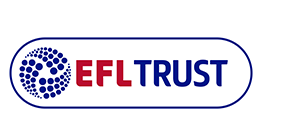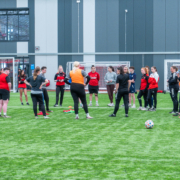Accelerating the progress of Women and Girls in Football
As we celebrate International Women’s Day, we look at how the network of EFL Club Community Organisations aim to give women in football and sport equal opportunities to succeed, and accelerate their progress in their chosen pathway.
With recognition that women were under-represented across the Football and Sport’s Coaching degree courses that are run at over 40 Clubs in partnership with the University of South Wales, the Female Development programme was established in the academic year of 2021-22 to ensure all women on the course were offered a tailored programme of opportunities to expand their knowledge and confidence with other women from other Clubs.
By ensuring an inclusive environment, with opportunities to network and hear from like-minded professionals in the sport, the programme ensures that the students on the degree course are provided with the opportunity to upskill and build confidence.
Throughout the year they have access to a variety of events that feature female professionals from a variety of roles within sport. This helps give students the confidence to seek out all the opportunities that are available to them.
Speakers to date have included senior members of the EFL Trust, who have shared their experiences of working in sport, from working off the field, to being front and centre on it. They have also heard from Daisy Croker who referees on the FA Women’s National League and the U21s Professional Game Academy League and has been involved in refereeing for the last 7 years, working her way through the ranks.
With coaching being a huge element of the degree courses, Jayne Jackson, EFL Trust’s Wildcats Project Manager provided the girls with best practices and advice on getting involved with their local Club Community Organisations and the Wildcats programme. As a result of this, some of the students have begun volunteering at their local Wildcats sessions.
From Grassroots football to the professional game, Charlotte Healy, Manchester United Women’s Assistant Coach will be a guest speaker next month as she discusses her journey and progression her from role as a community coach at Derby County Community Trust to the pinnacle of English football in the Women’s Super League.
With the opportunity to grow, develop and establish themselves in the industry, it is no wonder the Female Development programme has become a pivotal part in the increasing number of female students on the USW degree courses. With just 12 students in its first year, last year 36 students were engaged in the programme.
Whilst the University of South Wales degree programme creates opportunity for women to coach the game, our CCOs also offer a pathway for Girls to play the game. This is from the very first kick of a ball with Wildcats to the Talent Inclusion programme which helps girls who dream of representing England one day.
The Wildcats programme, in run partnership with the FA, is aimed at young girls aged 5-11 promotes a non-competitive, fun environment for all from those wanting to try football for the first time to girls who just want to play the game with girls the same age as them. This not only promotes fundamental skills required on the pitch but also develops life skills off it from effective communication to the ability to problem solve as part of a wider team.
Whilst only a small number of girls will go on to receive full senior caps at International level, our Talent Inclusion programme, also run in partnership with the FA, ensures every girl has equal chance to do so, regardless of their background.
The Talent Inclusion programme ensures that through existing community activities, participants with potential can be identified and referred to the FA England Women’s Talent Pathway. The EFL Trust’s CCOs work in some of the most deprived communities in England, where individuals and families experience challenges when trying to participate in sport and other activities. Women’s football has become a significant part of CCO delivery and engagement has hit an all-time high, given this, there is a considerable opportunity for potential to be identified and developed in the right environment. In particular, research from The FA has indicated that girls from low-socio-economic urban areas are not progressing into the talent system which is a lost opportunity for both young girls and the England team.
The Talent Inclusion programme is specifically run by over 60 EFL Club Community Organisations, who engage with young girls from low social economic communities and underrepresented groups, and look to refer talented players who, for whatever reason, may not be able to access traditional talent pathways.
It is paramount to the future of England women’s football that the pathway is a system for all. The EFL Trust and The FA are committed to working collaboratively to be creative and inventive to achieve this goal together.







